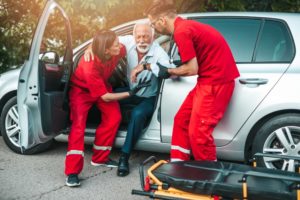
While our bones are strong, they are not meant to withstand unnatural forces like those that occur in a car accident. The impact itself can cause bones to break, or blows from a hard surface or debris can cause this type of injury. Most broken bones can be healed completely with the help of a Marietta car accident doctor, but depending on the location and severity of the fracture, they can be painful or cause you to miss out on months of activity. Certain bones are particularly vulnerable during a car accident and can be important to check for breaks after a crash.
Face and Skull Fractures
This type of break is most likely to happen when someone is not wearing a seatbelt, allowing their head to move and strike a hard surface such as the steering wheel or a windshield. In most cases, these fractures heal on their own with time, as they can’t be put in a cast. However, severe skull fractures can be life-threatening or cause brain damage if not properly treated, or if a piece of the loose skull is in contact with the brain.
Clavicle Fractures
Your clavicle, more commonly called your collarbone, is a fragile bone that is easily broken in a variety of situations. When it comes to car accidents, the clavicle is also near the seatbelt, which is designed to lock up and put pressure on your chest upon impact. This pressure keeps your body from being ejected from the car, but can also break the clavicle. While this area can’t be put into a cast, the arm may be immobilized using a sling or cast to avoid movement that worsens the injury. Paired with physical therapy, this allows the clavicle to heal.
Rib Fractures
Seatbelts can also put pressure on the ribs, causing one or multiple to break. In some cases, the deployment of an airbag will also be harsh enough to break ribs. Treatment for these fractures usually involves rest and careful movement as the bones heal. In rare cases, a broken rib can puncture a lung or nearby organ.
Arm and Wrist Fractures
If we see a car accident coming, many people’s instinct is to brace themselves for impact and extend their arms out frontward, or to grip the steering wheel tightly. Both these motions happen in a split second and are hard to stop, but can lead to broken bones in the arm, or the fragile bones in the wrist may fracture. These bones are commonly broken in general and can be treated easily by a Marietta car accident doctor.
Back or Spine Fractures
When the body thrashes, even a few inches, it can cause fractures in the discs that make up the spine, compressing them. In most cases, a back brace and physical therapy can be used to heal these injuries, though serious cases may require surgery to repair the bones.
Hip Fractures
The hip, a joint connecting the thigh bone to the pelvis, is critical to our mobility and is also very commonly broken, both in car accidents and otherwise. The complex nature of the hip means that if it breaks during an accident, healing may require screws and plates to stabilize the area.
Pelvis Fractures
Pelvis fractures can occur in a car accident if the legs are braced for impact, but they are actually more common in motorcycle accidents. Most pelvis fractures require a combination of bed rest and physical therapy to heal.
Leg Fractures
The legs are particularly vulnerable to injury in a car accident, especially for those sitting in the front seats of the car. If the car caves in, legs can become trapped between the floor and the dashboard, leading to breaks in the tibia or fibula. Bracing the legs for impact may also cause pressure that breaks these lower leg bones. While the thigh bone, or femur, is one of the strongest bones in the body, it can also be broken in a situation where the car crumples. The thickness of the femur actually makes it slower to heal than other bones.
Broken bones may be apparent immediately or may take a few hours to show symptoms, but should always be treated as soon as possible. If you have been in a car accident and may have a broken bone, AICA Marietta offers a range of Marietta car accident doctors who can diagnose and treat your fracture, no matter how severe.